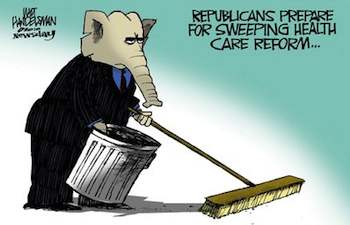- MENU
- HOME
- SEARCH
- WORLD
- MAIN
- AFRICA
- ASIA
- BALKANS
- EUROPE
- LATIN AMERICA
- MIDDLE EAST
- United Kingdom
- United States
- Argentina
- Australia
- Austria
- Benelux
- Brazil
- Canada
- China
- France
- Germany
- Greece
- Hungary
- India
- Indonesia
- Ireland
- Israel
- Italy
- Japan
- Korea
- Mexico
- New Zealand
- Pakistan
- Philippines
- Poland
- Russia
- South Africa
- Spain
- Taiwan
- Turkey
- USA
- BUSINESS
- WEALTH
- STOCKS
- TECH
- HEALTH
- LIFESTYLE
- ENTERTAINMENT
- SPORTS
- RSS
- iHaveNet.com
Mary Kate Cary

Democrats Hope Summit Will Revive Healthcare
It could be the title of a Robert Ludlum novel, like The Ambler Warning or The Bourne Sanction: It's the Palin Fallacy.
We
saw it at the
Over Super Bowl weekend, President Obama invited congressional Republicans to join him in a half-day televised summit on healthcare reform later this month. Despite the warnings of some on the right, it's not a mistake to say yes to this invitation. But it would be a mistake to commit the Palin fallacy and show up unprepared. With this healthcare summit, Republicans have a golden opportunity to show their ideas in the best light, and the last thing they should do is wing it. They need more than just a few notes written on their hands.
House
Polls show that big majorities of Americans oppose the Democrats' bills, so you'd think Democrats would want to restart, too. But Republicans shouldn't make that a condition for sitting at the table in the first place; they should say yes to negotiations and then work to scrap the bills once they get in the room. The cameras will be on, and they've got the American people on their side.
Legendary columnist Joe Alsop wrote about taking a "salami-slicing approach" to politics (he was writing about the "gradual" release of the Pentagon Papers). Republicans understand that voters don't want the whole salami of big government healthcare reform; instead, they should take out the knife and start slicing the salami until only the most cost-effective, deficit-reducing ideas remain -- ones which, by the way, the president says he supports.
Fiscally responsible,
scaled-back reforms could win the
Republicans need to prove that they're more than an opposition party -- as good a job as they've done with that -- and show that they are the party of those alternative ideas.
Some
There are other common-sense, free-market Republican ideas for healthcare reform that Americans support.
A January Rasmussen poll shows that 6 in 10 Americans favor limited jury awards in medical malpractice suits to lower costs, which Republicans have long supported. Done right, incremental healthcare reform can lower the deficit, cut costs, and maybe even take some of the burden off small-business owners.
Even though most of us agree that America has the best healthcare
system in the world in terms of quality, Republicans cannot defend the
status quo when it comes to skyrocketing costs to families and the
long-term cost to our economy. And if a modest form of healthcare reform
does pass, they'd do well to make sure that some
There are other benefits to the salami-slicing approach.
The Republicans have a
great opportunity to show how far left the Democrats are on this, to
make their case as principled, limited-government leaders and explain
the
Second, whether they are as well-spoken as the president or not, Republicans have a long and proud tradition of debating their ideas. Reasoning with people gets you a lot further than preaching or condescending. Jack Kemp and Bill Buckley would have said yes in a New York minute if given the opportunity to showcase common-sense, free-market ideas alongside the president. They would have seen it as a chance to win over a few doubting minds in the long run.
And third, it would show there's only one Republican these days who continues to engage in the Palin fallacy by showing up unprepared and unfocused. If Republicans jump into the policy trenches and Palin continues to stand by and watch, she'll be quickly marginalized.
As they say in Alaska, the Republican leadership should come to the healthcare summit loaded for bear.
WORLD | AFRICA | ASIA | EUROPE | LATIN AMERICA | MIDDLE EAST | UNITED STATES | ECONOMICS | EDUCATION | ENVIRONMENT | FOREIGN POLICY | POLITICS
Healthcare Reform - How Republicans Should Handle Obama's Health Reform Summit | Mary Kate Cary